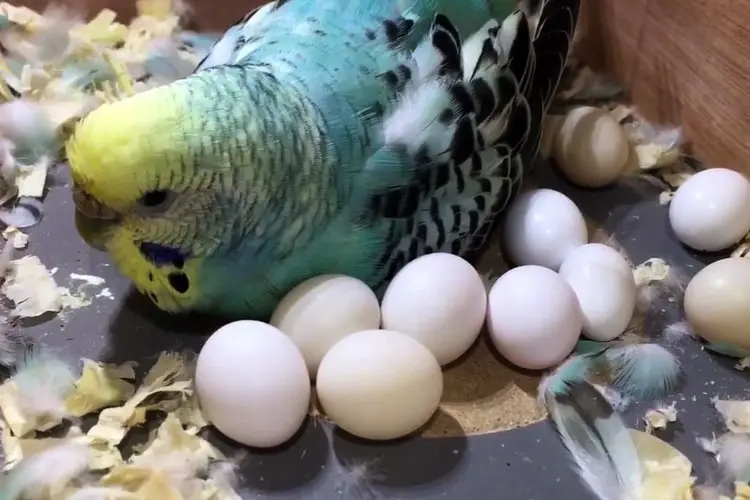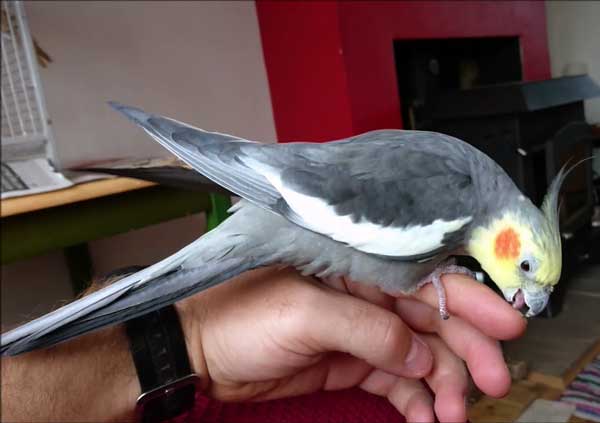Budgies will lay an average of 4 to 6 eggs in a single clutch during the breeding season. However, according to the budgie egg hatching chart, the eggs can only hatch after 18 days of incubation. But what is this chart all about, and how do you understand it properly?
The budgie egg hatching chart is a calendar to help you estimate the date your budgie’s egg will hatch. All you have to do was check the date when the first egg was laid. Then, match it with the date directly below it in the following line in the chart. The hatching could take up to 23 days.
But here is the thing; sometimes your budgie eggs may not hatch. So, keep reading to discover why this may happen and everything else about the hatching chart.
Budgie Egg Hatching Process
Budgie hens or budgerigars will lay between four and six or eight eggs. However, your birds can only produce one egg every two days, with each requiring at least 18 days of incubation.
In most cases, your female budgie usually starts incubating the eggs thoroughly after laying the second or third egg. After 18 days, the chicks will begin breaking free of their eggshell.
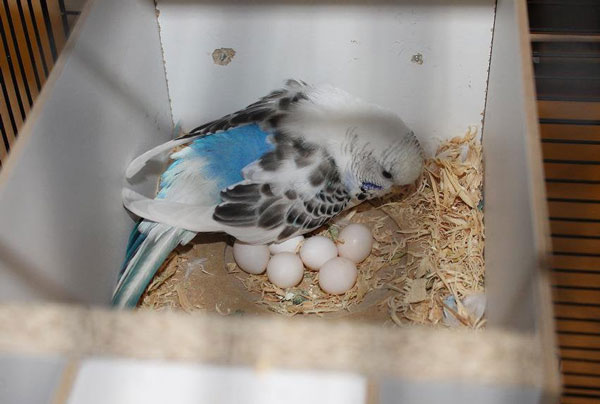
During this hatching process, your budgie chicks may communicate with their mother by making faint squeaks. Once the chicks break the shell entirely, the umbilical cord also detaches from the egg yolk. All the nutrients in the yolk are then reabsorbed in the chick’s body for sustenance during the first 24 hours.
Budgie Egg Hatching Chart and How To Understand It
Now that you know the process of budgie egg hatching below is a chart to help you understand everything better. This is simply an 18-day egg chart since budgie eggs take 18 to 23 days to hatch.
| JAN | 1 | 2 | 3 | 4 | 5 | 6 | 7 | 8 | 9 | 10 | 11 | 12 | 13 | 14 | 15 | 16 | 17 | 18 | JAN |
| JAN | 19 | 20 | 21 | 22 | 23 | 24 | 25 | 26 | 27 | 28 | 29 | 30 | 31 | 1 | 2 | 3 | 4 | 5 | FEB |
| FEB | 6 | 7 | 8 | 9 | 10 | 11 | 12 | 13 | 14 | 15 | 16 | 17 | 18 | 19 | 20 | 21 | 22 | 23 | FEB |
| FEB | 24 | 25 | 26 | 27 | 28 | 1 | 2 | 3 | 4 | 5 | 6 | 7 | 8 | 9 | 10 | 11 | 12 | 13 | MAR |
| MAR | 14 | 15 | 16 | 17 | 18 | 19 | 20 | 21 | 22 | 23 | 24 | 25 | 26 | 27 | 28 | 29 | 30 | 31 | MAR |
| APR | 1 | 2 | 3 | 4 | 5 | 6 | 7 | 8 | 9 | 10 | 11 | 12 | 13 | 14 | 15 | 16 | 17 | 18 | APR |
| APR | 19 | 20 | 21 | 22 | 23 | 24 | 25 | 26 | 27 | 28 | 29 | 30 | 1 | 2 | 3 | 4 | 5 | 6 | MAY |
| MAY | 7 | 8 | 9 | 10 | 11 | 12 | 13 | 14 | 15 | 16 | 17 | 18 | 19 | 20 | 21 | 22 | 23 | 24 | MAY |
| MAY | 25 | 26 | 27 | 28 | 29 | 30 | 31 | 1 | 2 | 3 | 4 | 5 | 6 | 7 | 8 | 9 | 10 | 11 | JUN |
| JUN | 12 | 13 | 14 | 15 | 16 | 17 | 18 | 19 | 20 | 21 | 22 | 23 | 24 | 25 | 26 | 27 | 28 | 29 | JUN |
| JUN | 30 | 1 | 2 | 3 | 4 | 5 | 6 | 7 | 8 | 9 | 10 | 11 | 12 | 13 | 14 | 15 | 16 | 17 | JUL |
| JUL | 18 | 19 | 20 | 21 | 22 | 23 | 24 | 25 | 26 | 27 | 28 | 29 | 30 | 31 | 1 | 2 | 3 | 4 | AUG |
| AUG | 5 | 6 | 7 | 8 | 9 | 10 | 11 | 12 | 13 | 14 | 15 | 16 | 17 | 18 | 19 | 20 | 21 | 22 | AUG |
| AUG | 23 | 24 | 25 | 26 | 27 | 28 | 29 | 30 | 31 | 1 | 2 | 3 | 4 | 5 | 6 | 7 | 8 | 9 | SEP |
| SEP | 10 | 11 | 12 | 13 | 14 | 15 | 16 | 17 | 18 | 19 | 20 | 21 | 22 | 23 | 24 | 25 | 26 | 27 | SEP |
| SEP | 28 | 29 | 30 | 1 | 2 | 3 | 4 | 5 | 6 | 7 | 8 | 9 | 10 | 11 | 12 | 13 | 14 | 15 | OCT |
| OCT | 16 | 17 | 18 | 19 | 20 | 21 | 22 | 23 | 24 | 25 | 26 | 27 | 28 | 29 | 30 | 31 | 1 | 2 | NOV |
| OCT | 3 | 4 | 5 | 6 | 7 | 8 | 9 | 10 | 11 | 12 | 13 | 14 | 15 | 16 | 17 | 18 | 19 | 20 | NOV |
| NOV | 21 | 22 | 23 | 24 | 25 | 26 | 27 | 28 | 29 | 30 | 1 | 2 | 3 | 4 | 5 | 6 | 7 | 8 | DEC |
| DEC | 9 | 10 | 11 | 12 | 13 | 14 | 15 | 16 | 17 | 18 | 19 | 20 | 21 | 22 | 23 | 24 | 25 | 26 | DEC |
| DEC | 27 | 28 | 29 | 30 | 31 | 1 | 2 | 3 | 4 | 5 | 6 | 7 | 8 | 9 | 10 | 11 | 12 | 13 | JAN |
But how do you use the chart? From the table above, you look at the date when your female budgie laid each of her eggs. The number directly below that date, which is on the following line, should be the hatching date for each egg. For instance, if your parakeet lays eggs on the 1st of January, the eggs will hatch on the 19th of January.
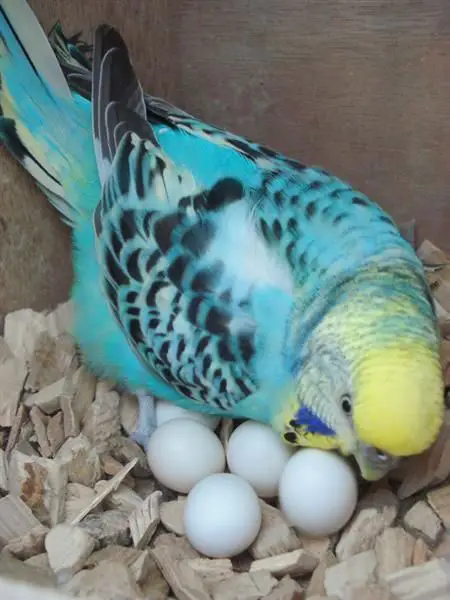
However, some budgies may not sit on their eggs until they have laid the second egg. This means they will start incubating the first egg after the second day of producing it.
Consequently, the first and second eggs will hatch on the same date. This means the first egg may take around 20 days to hatch. However, if there are unhatched eggs after 23 days, they will not produce chicks.
How To Tell If Budgie Eggs Will Hatch Or Not?
Unfortunately, not every egg your parakeets lay will hatch. So then, how do you know if your budgie eggs will hatch? Here are tips to help you.
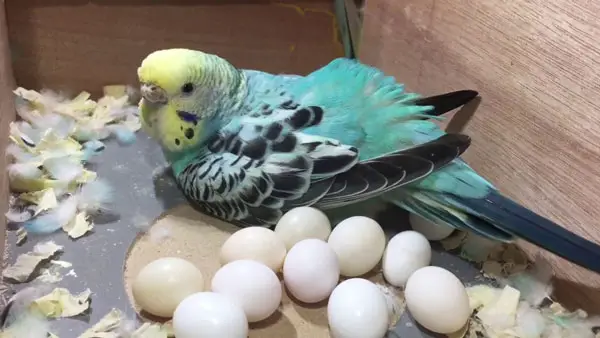
Candling the eggs
Egg candling involves shining a bright light through your bird’s eggs to see the interior after 5-6 days of incubation. You can use a small flashlight without moving the eggs. If you see red veins, the eggs will eventually hatch.
However, if the egg is white with a tiny yellow spot, it is unfertilized and will not hatch. If it is entirely yellow or white with some dark parts, it means the embryo is dead.
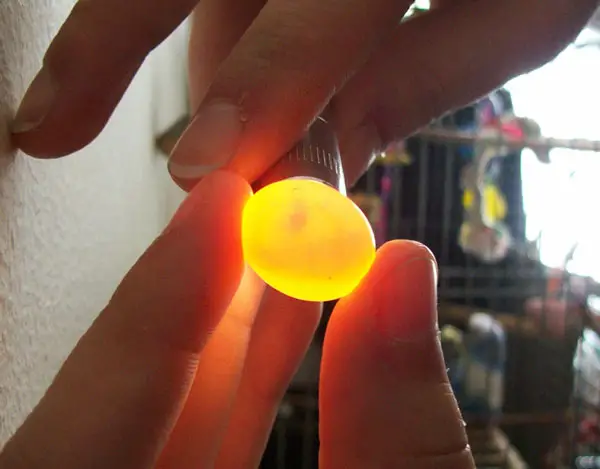
Warm eggs
If your budgie’s eggs feel warm, it is a good sign they will hatch. This is because budgie chicks need warm temperatures to develop correctly inside the egg.
Budgie sitting on the eggs
Once your budgie has laid her second or third egg, she will sit on them until they hatch. But if the eggs are not likely to hatch because they are infertile, your bird will not attempt to incubate them.
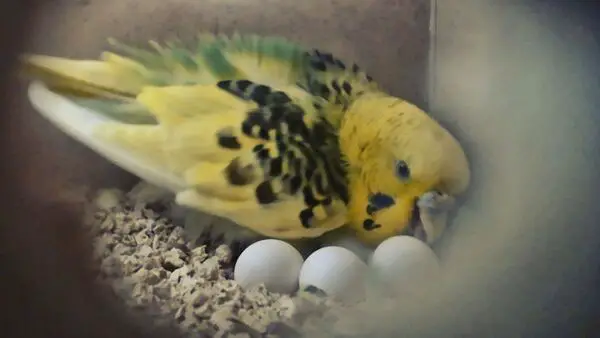
Why Is My Budgie Eggs Not Hatching?
Sometimes, the eggs of your budgie may not hatch for different reasons. As such, your bird may refuse to incubate the eggs. Some of the causes of hatching failure include:
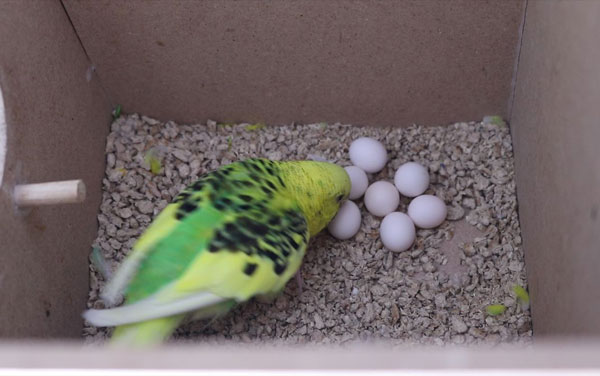
Unfertilized eggs
Female budgies don’t need to mate to lay eggs. They will lay unfertilized eggs if there are no males, which will not hatch. This may also happen if the male parakeet is infertile.
Neglecting the eggs
Sometimes, your budgie may not incubate her eggs up to full term. Consequently, the eggs may not hatch due to unsuitable temperature or humidity.
Poor nutrition
Female budgies require calcium in large quantities from mineral block or cuttlefish bone when producing eggs. Because if not, the birds may lay eggs with soft shells that fail to hatch.
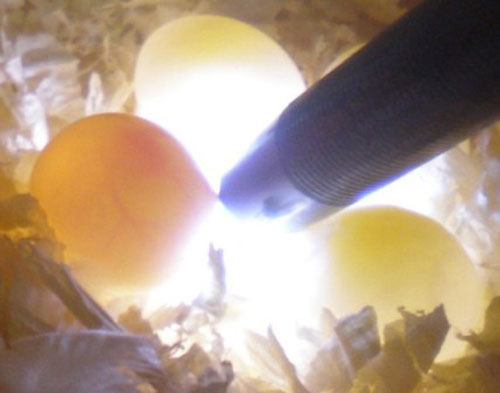
Budgie age
Young and old budgies are more prone to laying infertile eggs that don’t hatch. This is because parakeets generally have a limited supply of fertile eggs.
Should You Remove Unhatched Budgie Eggs?
Yes, but after some time, including the nest box. Typically, budgies will toss the unhatched eggs out or eat them after the hatch dates have elapsed. However, if this does not happen, you should remove and discard the eggs.
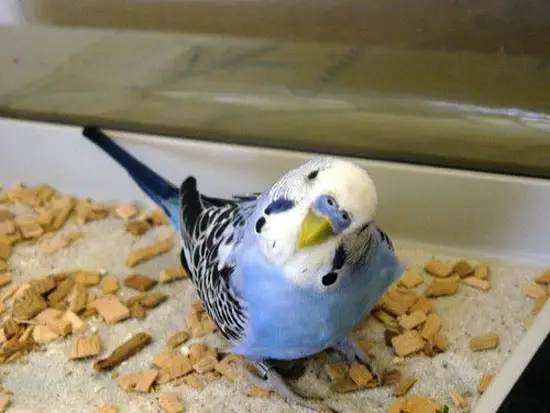
You also must take down the nest box after getting rid of the unhatched eggs. If you leave the nesting box in the cage, your budgies will keep breeding year-round. And as a result, your birds may die due to producing eggs too often.
FAQs
Want to learn more about the budgie egg hatching chart and how to understand it properly? Check out these commonly asked questions.
The eggs of budgerigars will hatch after being incubated for a full 18 days. However, because most birds only start incubating the eggs after laying the second, the hatching may take 18 to 23 days.
Yes. The eggs can hatch between 18 and 23 days. This happens because of factors like temperature and delay in incubation. However, if there is any unhatched egg after the 23rd day, they will not hatch.
Temperature is the most common thing that affects budgie egg hatching. Because if your budgies don’t sit on the eggs to keep them warm, the embryo may not develop.
Outro
The budgie egg-hatching process is something straightforward. This is especially true if you know how to read and interpret the 18-day egg-hatching chart. Besides, it is possible to tell if your parakeet’s eggs will hatch or not through candling. That said, you must remember that sometimes the eggs may not hatch because they are unfertilized.
